 Petzlover
Petzlover American English Coonhound is originated from United States but Bouvier des Flandres is originated from Belgium. Both American English Coonhound and Bouvier des Flandres are having almost same height. American English Coonhound may weigh 25 kg / 55 pounds lesser than Bouvier des Flandres. Both American English Coonhound and Bouvier des Flandres has same life span. American English Coonhound may have more litter size than Bouvier des Flandres. American English Coonhound requires Low Maintenance. But Bouvier des Flandres requires Moderate Maintenance
American English Coonhound is originated from United States but Bouvier des Flandres is originated from Belgium. Both American English Coonhound and Bouvier des Flandres are having almost same height. American English Coonhound may weigh 25 kg / 55 pounds lesser than Bouvier des Flandres. Both American English Coonhound and Bouvier des Flandres has same life span. American English Coonhound may have more litter size than Bouvier des Flandres. American English Coonhound requires Low Maintenance. But Bouvier des Flandres requires Moderate Maintenance
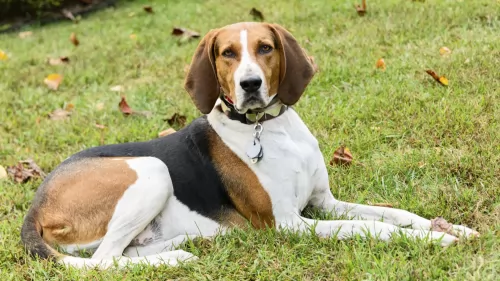 The American English Coonhound was developed in the Southern part of the United States from the variety of English hunting dogs that came to the States with the early settlers. At one point they were known as the Virginia Hound. This breed is well known for its prowess in hunting raccoons and her endurance and speed. Of course as a hound dog he loves to howl during the hunt and at home with the family. He can be frustrated and destructive if his energy and need for a job are not satisfied.
The American English Coonhound was developed in the Southern part of the United States from the variety of English hunting dogs that came to the States with the early settlers. At one point they were known as the Virginia Hound. This breed is well known for its prowess in hunting raccoons and her endurance and speed. Of course as a hound dog he loves to howl during the hunt and at home with the family. He can be frustrated and destructive if his energy and need for a job are not satisfied.
 These large dogs have descended from Flemish cattle dogs, and in French, the word Bouvier means herdsman or cattle herder. This is because the dog was used for driving cattle. The Bouvier comes from the Flemish region of Belgium where it was bred as a working farm dog. It is believed that the breed may have come from crossing local farm dogs with imported Irish Wolfhounds, Schnauzers, Tibetan Mastiffs, Brabanters, Griffons and Beaucerons.
These large dogs have descended from Flemish cattle dogs, and in French, the word Bouvier means herdsman or cattle herder. This is because the dog was used for driving cattle. The Bouvier comes from the Flemish region of Belgium where it was bred as a working farm dog. It is believed that the breed may have come from crossing local farm dogs with imported Irish Wolfhounds, Schnauzers, Tibetan Mastiffs, Brabanters, Griffons and Beaucerons.
It was in 1910 that the first Bouviers appeared at the international dog show in Brussels, with a standard for the breed being adopted in 1912.The American Kennel Club recognized the dog in 1929. It was after World War 11 that Bouviers were brought to America and the American Bouvier des Flandres Club was founded in 1963.
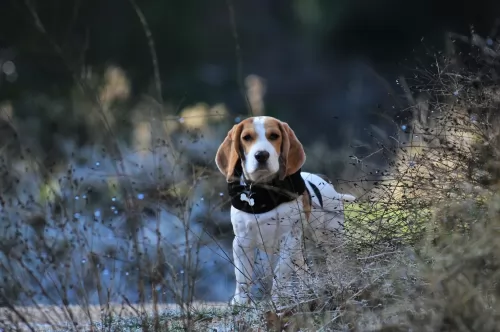 The American English Coonhound is an athlete with a deep chest and cute face. They have broad heads, domed skulls, dark eyes and soft, low ears. They are as fast and athletic as they look. These are highly athletic dogs with long legs and a slim but muscular body. They are so well built for their hunting role, that any deficiencies are quickly identified and bred out of the breed.
The American English Coonhound is an athlete with a deep chest and cute face. They have broad heads, domed skulls, dark eyes and soft, low ears. They are as fast and athletic as they look. These are highly athletic dogs with long legs and a slim but muscular body. They are so well built for their hunting role, that any deficiencies are quickly identified and bred out of the breed.
 The Bouvier is a large compact, well built dog with strong muscled limbs. He stands at roughly 59 to 70 cm high at the withers, weighing between 27 and 52 kg. He has a large head with a thick and abundant coat which is of rough appearance. The coat is mostly black, but you’ll also find a range of other shades such as brindle, grey and fawn.
The Bouvier is a large compact, well built dog with strong muscled limbs. He stands at roughly 59 to 70 cm high at the withers, weighing between 27 and 52 kg. He has a large head with a thick and abundant coat which is of rough appearance. The coat is mostly black, but you’ll also find a range of other shades such as brindle, grey and fawn.
The back of the dog is level and broad, and is typically wider in female dogs. The back legs are strong and muscular. Some Bouvier des Flandres are born tail-less and this is most attractive. Most Bouvier dog owners used to have the tails docked because of the excellent appearance, but with docking now being banned, the tail is kept long. The muzzle is wide, the nose large, the eyes dark brown and the ears high set and floppy.
The Bouvier is intelligent, energetic and full of confidence while being calm and balanced in temperament. The puppies are vocal and full of antics, but as the Bouvier grows into adulthood, he mellows and becomes a steady family friend who gets on well with each human family member. He loves spending time with his family and becomes both friend and guardian, making a good watchdog too.
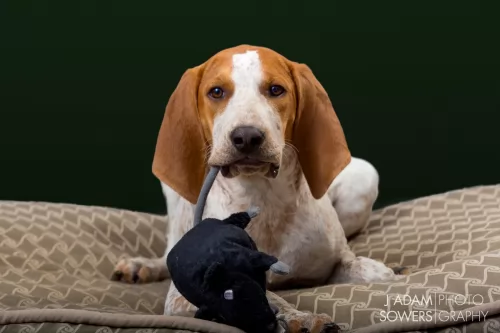 The American English Coonhound knows how to relax just as much as he knows how to work. He is mellow after work and tenacious in the chase. This is not the dog for a first-time owner. They are stubborn and hard to train. They howl and bark at home as much as they do on the hunt. They need a strong pack leader, especially when living in the city or neighborhoods.
The American English Coonhound knows how to relax just as much as he knows how to work. He is mellow after work and tenacious in the chase. This is not the dog for a first-time owner. They are stubborn and hard to train. They howl and bark at home as much as they do on the hunt. They need a strong pack leader, especially when living in the city or neighborhoods.
They are outgoing and friendly and very sensitive. They mature later than most other breeds their size. They are about 2 when they mature.
 The Bouvier is such an amicable dog and strong and energetic too. He makes the most marvellous companion and will happily adapt to life in the city or in the country, although, with his big size, he is better suited to a home where there is enough space to run around in.
The Bouvier is such an amicable dog and strong and energetic too. He makes the most marvellous companion and will happily adapt to life in the city or in the country, although, with his big size, he is better suited to a home where there is enough space to run around in.
He is loyal, loving and protective and when you make sure to make him an active part of your family, you’ll find in him all the characteristics of a true friend.
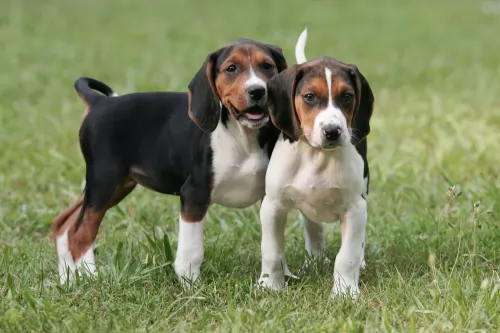 If kept active and happy, the American English Coonhound has very few health problems. The benefit from a large gen pool but do have some health concerns including elbow and hip dysplasia, ear infections, cataracts, bloat, and Progressive Retinal Atrophy. They do have a tendency to gain weight as they age. These issues will be addressed in more detail below. DNA testing is available for the dysplasia and eye issues.
If kept active and happy, the American English Coonhound has very few health problems. The benefit from a large gen pool but do have some health concerns including elbow and hip dysplasia, ear infections, cataracts, bloat, and Progressive Retinal Atrophy. They do have a tendency to gain weight as they age. These issues will be addressed in more detail below. DNA testing is available for the dysplasia and eye issues.
 The big teddy-bear of a dog is a healthy breed, but as a large dog, you will need to look out for certain health problems with him.
The big teddy-bear of a dog is a healthy breed, but as a large dog, you will need to look out for certain health problems with him.
Xrays have been done on many Bouvier des Flandres by the Club and by the Orthopedic Foundation of America and it has been found that a significant percentage of Bouviers were dysplastic. Hip dysplasia is a deformity of the hip joint and many large breed dogs battle with this. It can be very sad for dog lovers as they watch their dog battling to get up after lying down and sometimes lameness in the hind legs.
Dental disease is a common problem in many dogs, and the Bouvier isn’t excluded one bit. If you don’t brush your pet’s teeth with special dog toothpaste and toothbrush, there is tartar build-up which can lead to bad breath and gum infection. Dental disease can lead to pain in the teeth and even the loss of teeth. Bad teeth affect the entire body, and the heart, kidneys and joints can all be negatively affected.
The Bouvier is a large dog prone to obesity. This is a serious disease that can lead to all kinds of digestive disorders, back pain as well as heart disease. It can be easy just to give in to your pet’s pleading eyes, but in the long run, excessive weight can spell a host of health problems.
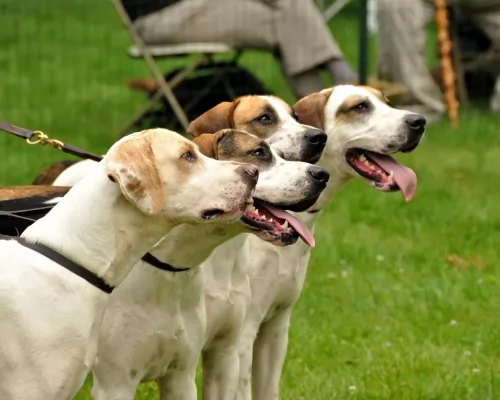 your working American English Coonhound needs different food than one who is not working. So, if you hunt with your dog remember he really needs the calories to keep his energy up. However, they can get obese as they age so cut back with less activity and more years. Watch the number of treats when training.
your working American English Coonhound needs different food than one who is not working. So, if you hunt with your dog remember he really needs the calories to keep his energy up. However, they can get obese as they age so cut back with less activity and more years. Watch the number of treats when training.
Elbow and Hip Dysplasia – the joint issues prevent the bones from connecting and functioning properly. Any good breeder of American English Coonhounds will do tests for both.
Eye issues range from cataracts to PRA (Progressive Retinal Atrophy) Again there are tests available for these conditions.
Bloat is a condition many medium to large size dogs can experience when their stomach can become inverted and intestines distended. The is a situational issue and can’t be predicted. Don’t allow your coonhound to wolf down food right before exercise and feed him more than once a day in a smaller meal.
The American English Coonhound needs a lot of exercise and has an extremely strong work and prey drive.
 Your Bouvier is an intelligent, independent dog and you will be doing him a favor by having him socialized and trained. He becomes such a pleasure to have around, being obedient and willing to respond to your commands.
Your Bouvier is an intelligent, independent dog and you will be doing him a favor by having him socialized and trained. He becomes such a pleasure to have around, being obedient and willing to respond to your commands.
Every dog, and particularly large dogs like the Bouvier, should be able to rely on a daily walk, a run in the park or on the farm and have special games from his owner. Not only does participating in activities together build a strong bond between dog and owner, its important to avoid boredom and frustration with your dog. You bought him so you therefore have a responsibility toward him.
Your Bouvier des Flandres has a thick, medium-length coat that gets a shaggy look to it. The breed needs regular brushing every second day or so to get rid of loose hairs and to prevent the hair matting. He will require some professional grooming to look and feel his best. With his thick coat, he is hypoallergenic which can be a relief for allergy sufferers.
The Bouvier has to be on high-quality dog food, whether you give him home-made food or commercially manufactured food. It has to have the right amount of vitamins and minerals. If you’re unsure about feeding a dog, remember that the amount and type of food you give your pet must be appropriate to your dog’s age, size and energy levels.It can also be wise to know which human foods are bad. Speak to your vet about your dog – they are a minefield of useful information about your pet. Fresh, cool water should be be available at all times.